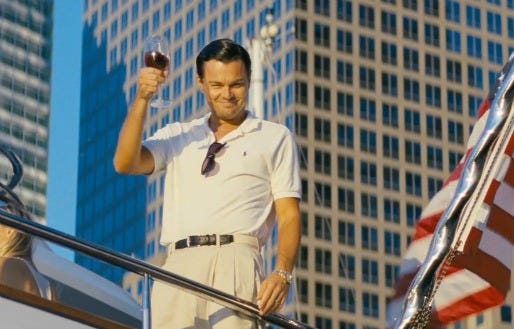The Wolf of Wall Street

If it seems like "The Wolf of Wall Street" bears more than a passing resemblance to Martin Scorsese's masterpiece "Goodfellas," that's because it does. Both films follow similar themes in relating a first-person account of a young guy who stumbled into way more wealth and power than he deserved and how he set about squandering it.
For Henry Hill, the mafia was his ladder up to the stratosphere of egomania and drug abuse; for Jordan Belfort (Leonardo DiCaprio), it was the stock market.
This mostly true story, based on Belfort's own book of the same title and translated by screenwriter Terence Winter, is a bacchanalia of drugs, hubris and debauchery. At three hours, it's a sprawling, untidy film that nevertheless often flirts with brilliance.
Tonally, the movie wanders this way and that, from raucous comedy to straight drama to fizzy caper and eventually into tragedy. But rather than being a film that seemingly can't decide what it wants to be, "Wolf" just opts to be everything at once — and does a very good job of it.
Set in the late 1980s and 1990s, the story follows Belfort as he rises (or descends, depending on your perspective) in the world of stock trading. Wiped out as a young broker in the crash of '87, he latches onto the penny stock market, where the values are tiny but the potential for huge commissions is like dripping red meat to a slavering, greedy talent like himself.
Recruiting some of his buddies — including a spot-on Jonah Hill as Donnie Azoff, his veneer-wearing, sycophantic right-hand man — Jordan founds Stratton Oakmont, a firm with a name designed to appeal to old-money types who normally wouldn't have anything to do with shady characters like themselves.
It's an overnight success, and they start attracting a lot of attention for their wild spending and frat-boy antics, such as the dwarf-tossing competition that first opens the movie, where Jordan throws $25,000 in cash on the ground as a bet.
Eventually, his operation attracts the notice of a dogged FBI investigator (Kyle Chandler) and the SEC. Jordan makes a show of wising up, even hiring his father (Rob Reiner) to be the office watchdog. He marries a beautiful model, Naomi, whom he dubs the duchess of his sprawling empire, and then uses her poorly. She's played by Margot Robbie, who, in the tradition of Scorsese leading ladies, has a sweet exterior covering up a hard-bitten core.
Rounding out the cast are Jon Bernthal as a street thug Jordan sometimes uses for muscle; Jean Dujardin as a slimy Swiss banker; Joanna Lumley as Naomi's somewhat helpful British aunt; and Ethan Suplee, Kenneth Choi and Barry Rothbart as Jordan's lunkhead recruits.
Matthew McConaughey has a brief and kooky, but delicious, cameo as a seasoned broker who first instructs Jordan in what it takes to be successful in the stock trading game — in short, a total disregard for others plus astonishing quantities of cocaine.
And there is plenty of both depicted in the movie. Scorsese has been criticized throughout his career for his reliance on violence, but with "Wolf," he trades in the gore for debauchery. He flaunts the sex-and-drugs material with the same relish he previously showed in beating people to a bloody pulp. There's enough nudity and kinky sex here to give "Blue Is the Warmest Color" a run for the title of most explicit Oscar contender this year.
Holding it all together is DiCaprio in his second magnificent performance of 2013, along with "The Great Gatsby." Callous yet charismatic, Jordan is a Quaalude-dropping, prostitute-hoarding, filthy-mouthed messiah to those who follow him. Making money is their first, and only priority in life. That, and a good party.
While some might be put off by the length and subject matter of “The Wolf of Wall Street,” it’s another career high point for both Martin Scorsese and Leonardo DiCaprio, and one of the year’s finest films. I’m betting they just might work together again if they can pay dividends as good as these.
4.5 Yaps



